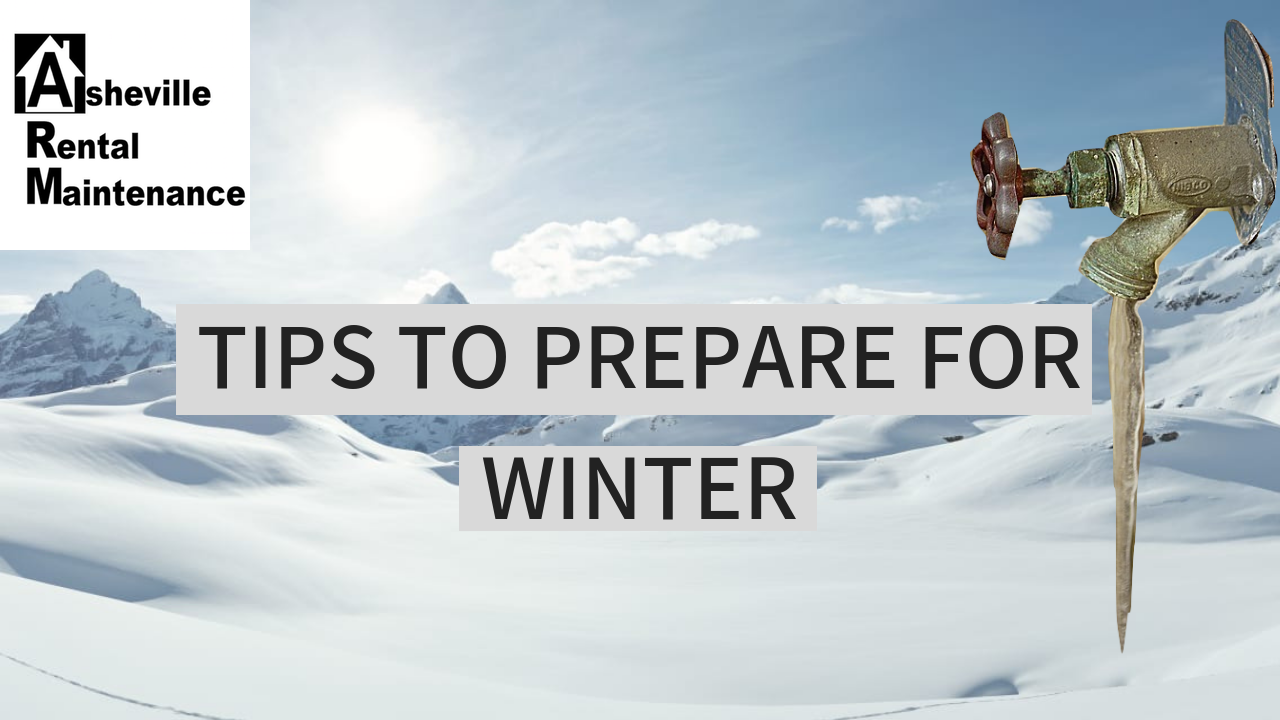Easy Tips to Prepare Your House or Rental For The Winter
No season strikes fear into the heart of a homeowner quite like winter. Freezing temperatures and often harsh weather conditions can wreak havoc on a home, from burst pipes to leaky roofs and sky-high heating costs. For owners of rental properties, these threats can be even scarier due to a reduced measure of control. To help alleviate those fears and ensure that every homeowner is prepared for winter, we sat down with Ben Wall, co-owner of Asheville Rental Maintenance, to talk preparedness and proactivity.
Asheville Rental Maintenance, according to Wall, specializes as the all-around fix-it guys for landlords and property owners. They can help fix even small issues that may not justify calling a major repair company but might still fall outside of the skill set of the property owner. Given the range of problems and projects that he sees through his work, Wall knows a thing or two about property ownership in every season.
“Homeownership or property ownership is certainly not passive by any means,” he says. “It’s very much like a living, breathing asset that takes a lot of care.” This can be daunting enough when you own a single property in which you reside but is even more of a challenge if you own and rent out multiple properties. While companies like Asheville Rental Maintenance can help to alleviate the burden when things go wrong, Wall sees prevention as the best medicine.
So what exactly do homeowners need to do to prepare for the cold and make sure that their properties are taken care of? “There are a couple of really obvious things out there,” Wall says, and “a few that are cheap to free to address.”
One of the most overlooked but most impactful preventive measures, in Wall’s view, is to disconnect hoses from their hose bibs. According to Wall, hose bibs in this part of the country are generally designed to allow water to drain out and prevent freezing. If the hose is left attached, the water can’t drain out and may freeze in the pipes. At the first frost of the year, Wall suggests that homeowners go out and disconnect the hose. This will allow the bib to do its job and prevent ruptured pipes from freezing over the winter. It’s a simple measure that doesn’t cost anything at all but can save a lot of headache and money.
Another factor to consider is pipe insulation. Many homeowners think that pipe insulation is enough to prevent freezing no matter how low the temperature dips, but that’s not necessarily the case. Pipe insulation, Wall says, acts kind of like a jacket – it holds in the heat generated from within, as when warm water flows through the pipes. So, if no hot water is running and the space in which the pipes are located is cold, insulation will do little to prevent freezing. There are several remedies to this problem, including heat cord or heat tape that can be wrapped around pipes to prevent them from freezing even if the temperature drops very low. Another option is to place a space heater in the area where the pipes are located, to keep the ambient temperature from dropping below freezing. Either option will be effective even if tenants don’t take the necessary steps to prevent pipes from freezing on their end.
One cold-weather maintenance task that Wall says many homeowners overlook is keeping the gutters clean and clear of leaves. If leaves clog the gutters and then snow and ice began to build up on top of and behind them, they can create an “ice dam” that may push additional freezing water up beneath the roof’s shingles. This will shorten the lifespan of the roof and potentially cause leaks, which can be frustrating and costly for both the homeowner and tenant.
A common concern for many renters – and therefore their landlords – is the expense of heating a rental home during the winter. While it’s inevitable that costs will rise as the temperature falls, landlords can take a few simple steps to keep their renters’ wallets happy. First, landlords should consider installing weatherstripping around doors and windows. This is easy and relatively expensive to do and will improve energy efficiency and extend the life of heating systems on top of reducing power bills. Another very simple and often overlooked measure is to reverse the direction of ceiling fans. Most modern fans include a switch that determines the direction of the fan, enabling it to perform its usual function in the summer or, in the winter, to pull cold air up and push warm air back down.
Wall stresses the importance of being prepared for winter as a property owner and landlord – you can’t always trust tenants to do everything necessary to protect a rental, he says, so make sure to be proactive and try to put measures in place to prevent damage even if they don’t do exactly what they should. This will save you time, money, and the potential for a disgruntled tenant, and, according to Wall, many of the steps are quick, inexpensive, and easy.
If you need help preparing your rental property for winter or repairing the damage that the weather can cause, Asheville Rental Maintenance can help! To schedule an appointment, call 828-767-0794 or email [email protected].




